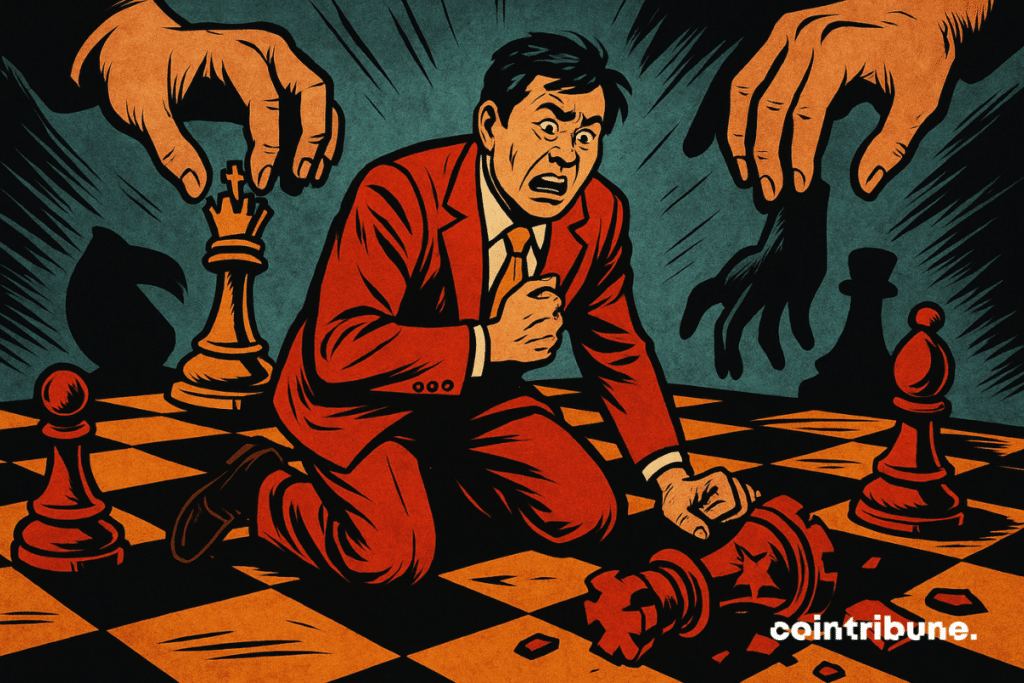China’s Economy Slips Into Deflation—Here’s Why Wall Street Is Sweating
Factory gates creak shut as prices keep falling—Beijing’s stimulus bazooka looks suspiciously like a water pistol.
Deflation’s grip tightens: Consumer prices drop for the third straight quarter while industrial overcapacity floods global markets. Remember when ’Made in China’ meant cheap goods, not cheapening growth?
The PBOC’s rate cuts vanish faster than a retail investor’s crypto portfolio. Meanwhile, local governments play whack-a-mole with debt crises—just don’t call it quantitative easing (wink).
Bottom line: When the world’s second-largest economy starts hoarding cash instead of spending it, even Bitcoin maximalists start checking inflation hedges. The 2008 playbook won’t work this time—unless someone invents a blockchain for printing yuan.

In Brief
- In April, the CPI dropped by 0.1% and the PPI by 2.7%, signaling entrenched deflation.
- Beijing is redirecting its exports towards the internal market, but demand remains structurally weak.
- JD.com and Freshippo are mobilized to clear unsold stocks, due to insufficient solvent buyers.
- The restaurant industry suffers from tariffs: shortage of American beef in China, skyrocketing prices in the United States.
Consumption: a Wobbly Economy, a Threat Rising in China
Deflation is looming in China. For three consecutive months, consumer prices have fallen. In April, the CPI dropped by, and the Producer Price Index (PPI) fell by. This continual decline is more than just a statistic. It reveals. And when households stop buying, the entire economic structure is shaken.
China is no longer that vibrant hive. Credit is more accessible, banks are injecting liquidity, but. Why? Too much debt, a bursting real estate bubble, an uncertain job market. Chinese citizens hold onto their money, like holding a candle in a power outage.
Even food feels the impact. Food prices have fallen by.
“Consumers remain cautious in the face of economic uncertainty,” reads the official report cited by the South China Morning Post.
Despite price drops,.
Too Much to Sell, Not Enough Buyers: The Domestic Trap
Faced with exports slowed by trade tensions, China played an unexpected card. It asks its manufacturers to. An economic recycling that poses a problem: if no one wants or can buy, this MOVE only inflates the bubble further.
- -0.1%: drop of the CPI index in April;
- -2.7%: year-on-year PPI decline, the sharpest drop in 6 months;
- +0.3%: symbolic price increase in services;
- 0%: real growth in several analyzed urban areas;
- +17.1%: jump in industrial production in January-February, followed by a notable slowdown.
JD.com and Freshippo have been mobilized to help clear surpluses. But selling merchandise to an uninterested customer remains a risky bet. CNBC warns:
Deflation could worsen if supply significantly exceeds waning demand.
And this imbalance is visible abroad. In the United States,. Tariffs are hurting supply chains. In China, high-end establishments struggle to provide American beef. The SCMP highlights:
Chinese restaurants in New York adjust their menus to compensate for rising prices.
When even the dishes change, it’s a sign the economy is struggling to digest the situation.
Stimulus Measures or a Band-Aid on an Open Fracture?
. Targeted loan programs have been launched. The state supports certain key industries. Yet,. These monetary injections resemble more a bandage than a real surgical operation.
Big words are no longer enough. Consumers are waiting. They want guarantees, not slogans. Fear of the future hinders consumption. And the Chinese economic miracle now looks like a poorly performed magic trick.
Beijing is also betting on logistical reorganization. Encouraging local sales is an attempt to absorb external shocks. But again, the strategy wobbles. Retreating inward is not a sustainable solution.
The situation recalls a proverb: you cannot empty the ocean with a ladle. Meanwhile, nets remain empty in Chinese kitchens, as in economic forecasts.
China is seeking solutions. According to a BlackRock analyst, it could turn to cryptos or Gold as stability reserves. After all, isn’t it already the second-largest holder of bitcoins in the world? What once seemed like a whim may be becoming a strategy.
Maximize your Cointribune experience with our "Read to Earn" program! For every article you read, earn points and access exclusive rewards. Sign up now and start earning benefits.

